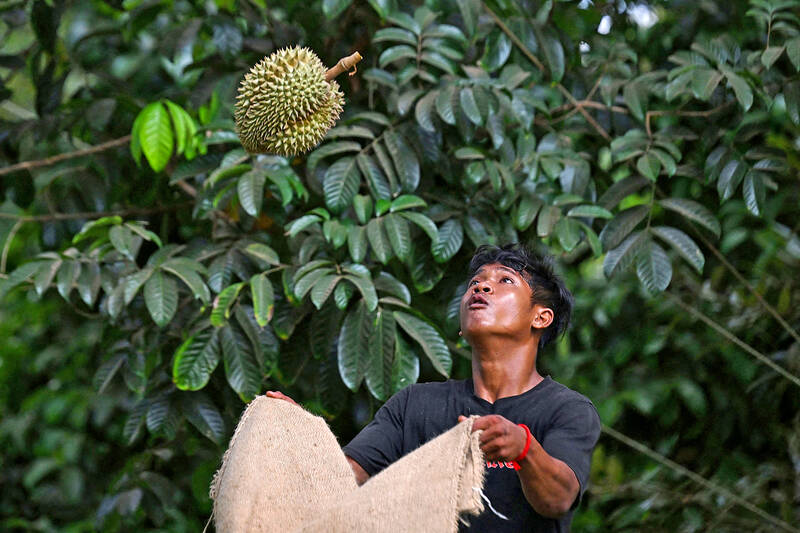Clambering hand-over-hand, sweat dripping into his eyes, a durian laborer expertly slices a cumbersome fruit from a tree before tossing it down to land with a soft thump in his colleague’s waiting arms about 15m below.
Among Thailand’s most famous and lucrative exports, the pungent “king of fruits” is as distinctive in its smell as its spiky green-brown carapace, and has been farmed in the kingdom for hundreds of years.
However, a vicious heat wave engulfing Southeast Asia has resulted in smaller yields and spiraling costs, with growers and sellers increasingly panicked as global warming damages the industry.

Photo: AFP
“This year is a crisis,” durian farmer Busaba Nakpipat said.
The 54-year-old took over her parents’ farm in eastern Chanthaburi Province — Thailand’s durian heartland — three decades ago.
“If the hot weather continues to rise in the future, it’ll be over,” she said. “Farmers wouldn’t be able to produce durian anymore.”
Durian season usually lasts from March until June, but the soaring temperatures — which in Chanthaburi have hovered around 40°C for weeks — and subsequent drought have shortened the harvest.
Busaba said the heat causes the durian, which is graded by weight and size, to ripen faster so it does not grow to its fullest size, making it less valuable.
“The quality of the durian won’t meet the standard,” she said.
Not only is she getting less money for the crop, but Busaba’s operational costs have risen.
Since March a drought has sucked water from the wells, and to keep her precious durian trees alive Busaba is forced to bring in thousands of liters by truck.
“We have to buy 10 water trucks for 120,000 liters of water for one-time watering of the whole 10-rai [1.6 hectares] of our farm,” she said, adding that she repeats the process every other day at a cost of thousands of dollars.
“We have prayed for rain, but there was no rain,” she said.
Thailand’s durian exports are worth billions and are the kingdom’s third-most valuable agricultural product — behind rice and rubber.
Yet in a nearby durian market, anxiety is running high among stall-holders, many of them with family businesses going back generations.
Siriwan Roopkaew, 26, working at her mother’s stall, said the lack of water has affected the size of the fruit, but for now prices remain high thanks to demand from China.
About 95 percent of Thaliand’s durian exports are to China, which last year shipped nearly US$4.6 billion worth of the love-it-or-hate-it fruit from the kingdom, Chinese Ministry of Commerce data showed.
However, the heat is threatening Thailand’s dominance.
Chinese state media has reported an almost 50 percent rise in durian imported from Vietnam, citing heat and drought in Thailand.
“Hot weather means there will be less durian. Even this year, there is less durian,” Siriwan said.
“Normally, my stall would be full of durian by now.”
While farmers worry about water, sellers like her family are more concerned about the knock-on economics, she said.
“Less durian means our earnings are less, so it’d be hard for us to live the whole year,” she said.
Back at the farm, Busaba sighed as she considered the months ahead.
“The future of durian, it’s over if there’s no water,” she said.

Real estate agent and property developer JSL Construction & Development Co (愛山林) led the average compensation rankings among companies listed on the Taiwan Stock Exchange (TWSE) last year, while contract chipmaker Taiwan Semiconductor Manufacturing Co (TSMC, 台積電) finished 14th. JSL Construction paid its employees total average compensation of NT$4.78 million (US$159,701), down 13.5 percent from a year earlier, but still ahead of the most profitable listed tech giants, including TSMC, TWSE data showed. Last year, the average compensation (which includes salary, overtime, bonuses and allowances) paid by TSMC rose 21.6 percent to reach about NT$3.33 million, lifting its ranking by 10 notches

Popular vape brands such as Geek Bar might get more expensive in the US — if you can find them at all. Shipments of vapes from China to the US ground to a near halt last month from a year ago, official data showed, hit by US President Donald Trump’s tariffs and a crackdown on unauthorized e-cigarettes in the world’s biggest market for smoking alternatives. That includes Geek Bar, a brand of flavored vapes that is not authorized to sell in the US, but which had been widely available due to porous import controls. One retailer, who asked not to be named, because

SEASONAL WEAKNESS: The combined revenue of the top 10 foundries fell 5.4%, but rush orders and China’s subsidies partially offset slowing demand Taiwan Semiconductor Manufacturing Co (TSMC, 台積電) further solidified its dominance in the global wafer foundry business in the first quarter of this year, remaining far ahead of its closest rival, Samsung Electronics Co, TrendForce Corp (集邦科技) said yesterday. TSMC posted US$25.52 billion in sales in the January-to-March period, down 5 percent from the previous quarter, but its market share rose from 67.1 percent the previous quarter to 67.6 percent, TrendForce said in a report. While smartphone-related wafer shipments declined in the first quarter due to seasonal factors, solid demand for artificial intelligence (AI) and high-performance computing (HPC) devices and urgent TV-related orders

MINERAL DIPLOMACY: The Chinese commerce ministry said it approved applications for the export of rare earths in a move that could help ease US-China trade tensions Chinese Vice Premier He Lifeng (何立峰) is today to meet a US delegation for talks in the UK, Beijing announced on Saturday amid a fragile truce in the trade dispute between the two powers. He is to visit the UK from yesterday to Friday at the invitation of the British government, the Chinese Ministry of Foreign Affairs said in a statement. He and US representatives are to cochair the first meeting of the US-China economic and trade consultation mechanism, it said. US President Donald Trump on Friday announced that a new round of trade talks with China would start in London beginning today,